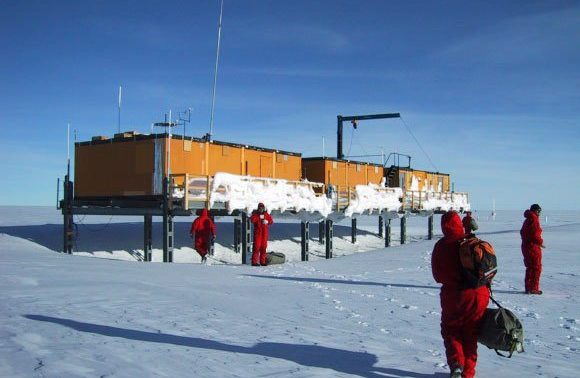(单词翻译:单击)
Scientists studying freshly fallen snow in Antarctica have uncovered a rare isotope of iron in the interstellar dust hidden inside it, suggesting the dust showed up recently.
研究南极洲新落雪的科学家在雪中隐藏的宇宙尘埃中发现一种罕见的铁同位素,这表明这种尘埃是最近出现的。
This discovery could give us crucial information about the history of stellar explosions in our galactic neighbourhood.
这项发现或许给我们提供了银河系附近行星爆炸历史的关键信息。
We know that cosmic dust is drifting down to Earth all the time, tiny bits of debris from the rough and tumble of star and planet formation, sometimes billions of years old.
我们知道宇宙尘埃一直都飘向地球,这些尘埃来自恒星的混乱和行星岩层,有些已经数十亿岁了。
Antarctica is a great place to look for such dust, because it's one of the most unspoilt regions on Earth, making it easier to find isotopes that didn't originate on our own planet.
南极是找寻这种尘埃的绝佳场地,因为这是地球上最没有受到破坏的地区之一。这使得找到非地球原产的同位素更加容易。
In this case, the isotope that researchers have pinpointed is the rare 60Fe (or iron-60), one of many radioactive variants of iron.
在这个案例中,研究员确定的同位素是罕见的60 Fe(或者铁-60),铁众多的同位素中的一种。

Previously, the presence of this iron in deep-sea sediment and fossilised remains of bacteria has suggested one or more supernovae exploded in Earth's vicinity between 3.2 and 1.7 million years ago.
之前,这种铁出现在深海沉淀物和细菌的化石遗骸中,表明一个或多个超新星在320万年至170万年前在地球附近爆炸了。
The new study marks the first time interstellar iron-60 has been detected in recent Antarctic snow - the dust would have fallen from the skies within the last 20 years, the researchers say.
这项新研究标志着铁60首次在最近的南极雪中被检测到。研究员说,尘埃可能是在过去20年间从天空中掉落下来的。
"I was personally very surprised, because it was only a hypothesis that there might be iron-60 and it was even more uncertain that the signal is strong enough to be detected," nuclear physicist Dominik Koll from Australian National University told ScienceAlert.
“我个人觉得很惊讶,因为那里可能存在铁60只是一个假设,信号能强到足够被探测到就更不确定了。”澳大利亚国立大学的核物理学家多米尼克·科尔告诉ScienceAlert网(科学警报)。


